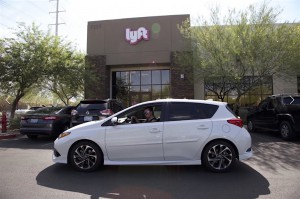
Lyft drivers in California were hours from not having jobs as the company said its as shutting down operations there.
Hours before Lyft was set to shut down its operations in California, a federal judge gave the ride-hailing service – along with rival Uber – a reprieve, temporarily blocking the state’s move to have drivers declared employees, rather than independent contractors.
Both companies will be able to continue business as usual, for now, though the stay will hold while the courts consider their appeal of the new California guidelines.
The new rules, which had been approved by a California Superior Court Judge earlier this month, would have meant Lyft and Uber drivers were entitled to such benefits as overtime, sick pay, minimum wages and unemployment insurance. The two companies warned they couldn’t continue operating if faced with the potential costs the move would have added.
(Uber, Lyft lose in court — again.)
Companies operating in the “gig economy” have been facing growing pushback from workers, as well as employment advocates who contend that wealthy companies are buoying their fortunes on the backs of those who have no safety net should they run into trouble. California is just the latest venue where that argument is playing out.

California Attorney General Xavier Becerra said Lyft and Uber drivers are being expected to carry more responsibility than they should.
Under a California law known as AB5 that was passed last September, companies would have to pass what has been dubbed the “ABC test” to justify classifying workers as independent contractors. The two ride-hailing giants insisted they met the guidelines, but this past May the state’s Attorney General Xavier Becerra filed for a preliminary injunction aimed at forcing them to comply.
On Aug. 10, Superior Court Judge Ethan Schulman sided with the state. “It’s this simple,” he ruled. Uber and Lyft are not “multi-sided platforms” but “transportation companies.” He went on to dismiss the position the two companies took in their joint lawsuit declaring, it “flies in the face of economic reality and common sense … To state the obvious, drivers are central, not tangential, to Uber and Lyft’s entire ride-hailing business.”
Responding to the court verdict, AG Becerra said that Lyft and Uber workers “shouldn’t have to foot the bill when big businesses try to skip out on their responsibilities. We’re going to keep working to make sure Uber and Lyft play by the rules.”
“Today’s ruling affirms what California drivers have long known to be true,” Mike Robinson, a Lyft driver and member of the Mobile Workers Alliance, a group of Southern California drivers, said in his own statement at the time, “workers like me have rights and Uber and Lyft must respect those rights.”
(Uber, Lyft suffer legal setback in case about driver status.)
But the two services said they didn’t intend to adopt the new rules and would rather close down operations in California. Lyft was planning to do so as of 12:01 a.m. on Friday. For its part, Uber said it would take a similar step, though it had not yet set a hard deadline.
Both companies indicated interest in finding they called a “third way” between contractor and employment status. Meanwhile, they have both contributed heavily to a ballot measure, Proposition 22, which would rescind the employment law.
Uber and Lyft aren’t alone in opposing the regulation, the mayors of San Diego and San Jose, two of California’s largest cities, siding with their appeal and showing bipartisan opposition.
“Being forced into a situation where shutting down service is the only viable option hurts everyone at a moment when we need to pull together to help more Californians make ends meet,” said San Diego Mayor Faulconer, a Republican, and San Jose Mayor Sam Liccardo, a Democrat.
It has not yet been announced when the case will actually come up before the appeals court.
(Uber, Lyft hit by decision declaring drivers are employees.)
The prospect of having to abide by the regulations resulted in some sharp hits to the shares of both companies, as did the threat of leaving California, one of the largest U.S. markets for ride-sharing services.



Becerra blinked and California Uber and Lyft drivers won. Becerra lost last week to the 9th circuit regarding gun magazines. Becerra is becoming a liability to countless folks and consumers.